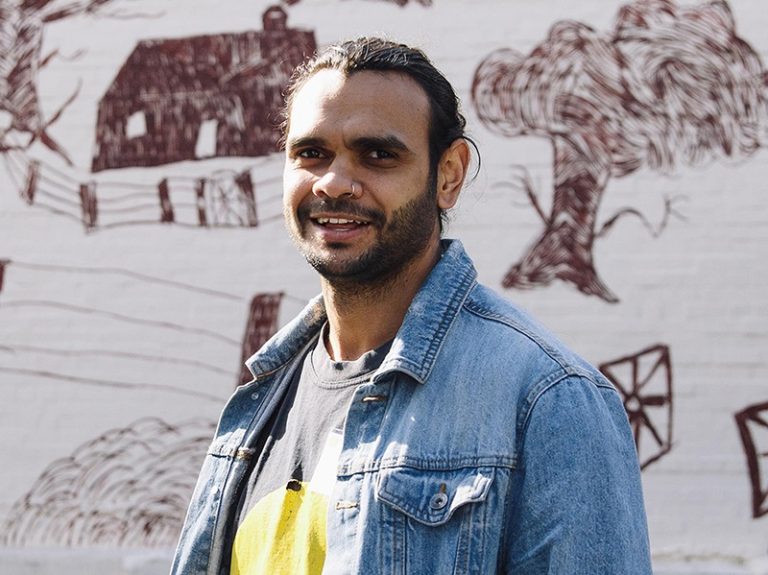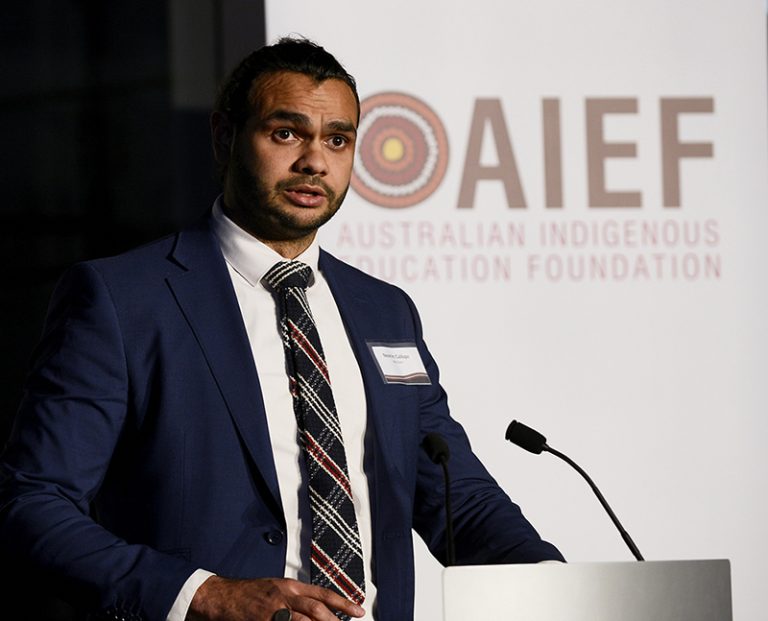“I find it difficult to articulate what St Augustine’s College did for me, and what that cohort of lads did for me. This experience helped me become the man I am today.”
Neerim completed Year 12 on an AIEF Scholarship in 2010 at St Augustine’s College in Cairns.
Hi there
I’m Neerim, a proud Kirraewhurrong and Gkuthaarn man and one of AIEF’s first graduates. I grew up in northwest Queensland, in the Gulf of Carpentaria, in a remote community called Normanton.
At that time, Normanton only had a primary school and education options were limited. My family encouraged me to go to boarding school – especially my dad. He received a scholarship to attend a school in Brisbane when he was about my age. Although we grew up out in the bush, my siblings and I always had that frame of reference that Western education would open doors and give us tools to succeed in the world.
In my senior years at school, I received an AIEF Scholarship, and I joined a few other young Indigenous boys from across north Queensland boarding at St Augustine’s College in Cairns.
At home it was bush, red soil country. You’d finish school and get into the river or go fishing. Then, it was an all boys, private Catholic school – socks up to your neck, hair couldn’t be over your ears, stand behind your desk every day, shirt tucked in, make sure your shoes are polished. Very different, but it certainly had its merits.
I was very fortunate to have other Indigenous students in my year. We were all away from Country, and we all knew what that felt like and could support one another. It transformed into a real brotherhood. There are boys I went to school with who I still hold amongst my nearest and dearest friends.
I loved my time at St Augustine’s. I find it difficult to articulate what that school did for me, and what that cohort of lads did for me. And the teachers that were there. It’s a very special school. This experience helped me become the man I am today.
After I graduated from St Augustine’s, I wasn’t sure what I wanted to do. I was trying to decide what kind of job I wanted, what career path to take and what to do at university. I knew that I wanted to work with Indigenous communities – helping them remove barriers so they could achieve empowerment.
One day, at an AIEF Alumni Networking Event, I met an AIEF Pathways Advisor who I really connected with. I have always been a very energetic person, and his calm energy counterbalanced me.
I started to yarn to him about what I wanted to do and my future. He took the time to listen to me, understand me and meet me where I was at. I wanted it to seem like I had an answer, but I didn’t really have any answers.
Through talking to him, and other staff at AIEF, I decided to move down to the University of Melbourne and ended up with a place at College. They were really defining early years for me in Melbourne. And it was an advisor at AIEF who took the time to work with me to provide advice and guidance to cut through the noise.


Fast forward and AIEF helped me secure an internship in Sydney at HSBC in global banking and markets. HSBC really made an effort to develop the interns and make the internship feel empowering. It wasn’t just something they were doing to include in their annual report – they were genuinely interested in supporting young Indigenous people to develop professionally.
The internship was phenomenal. The people were brilliant, very accommodating, and I actually still check in with my mentor from HSBC from time to time. Ultimately banking wasn’t for me. The internship led me to understand that maybe I didn’t want to do Finance and Economics, so I switched to a Bachelor of Arts majoring in Criminology and Psychology.
Today, I’m the Acting Director of the Koori Justice Unit in Victoria. My team’s responsible for managing a portfolio of public funds that are administered to Aboriginal community controlled organisations. We don’t just administer the funding, though. We work with those organisations to ensure that the programs that they want to deliver, the design makes sense to their communities.
I look at ways to enhance self-determination for Aboriginal people, ensuring that the voices of grassroots and local communities are heard in setting the strategic priorities of the Department of Justice, and ensuring that their voices shape the actions and priorities. That’s a real key for us. Self-determination isn’t a throwaway line, it’ a principle we bring to life in the work that we do every day.
This is what AIEF does so well. The AIEF model is directly linked with self-advocacy. Families have the choice as to whether they want their children to go to boarding school. It doesn’t remove agency – it enhances it. AIEF gives Indigenous families the opportunity to get a quality education that they may not otherwise have.
To receive an AIEF Scholarship, you’ve got to apply, you’ve got to get in and then AIEF provides the funding and support.
It makes the students feel like they earned their spot. They go to these schools because of what’s between their ears and what’s in their heart. They have the opportunity to find that area of intersection between success and progress in the Western world, without compromising their values and identity.
AIEF isn’t just an organisation to me – it’s something more personal. I have my family and my parents, but for me AIEF has always been an objective sounding board, helping me to think things through and follow what my spirit is telling me to do.
The greatest contribution we can make to our communities is to be the best version of ourselves.
I’ve been given plenty of opportunities to meet people and speak about the work of AIEF. And for me, I love doing that because it’s an hour here or two hours there for me, but what that could amount to in terms of a child’s education, I think, is invaluable.
